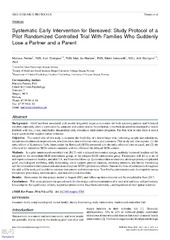| dc.description.abstract | Background: Grief has been associated with several long-term negative outcomes for both surviving parents and bereaved children, especially when it is preceded by unnatural and violent deaths. Nevertheless, it has been an underestimated public health problem with few, if any, empirically documented early preventive intervention programs. The best time to start them is also a major question that requires further evidence. Objective: The overall aim of this study is to assess the feasibility of a future larger trial, informing sample size calculation, recruitment/randomization procedures, retention rates, data collection forms, and outcomes. This study will also explore: (1) the early effects of Systematic Early Intervention for Bereaved (SEIB) compared with the early effects of care as usual, and (2) the effects of the immediate SEIB version compared with the effects of the delayed SEIB version. Methods: In a pilot randomized controlled trial (RCT) with a delayed intervention design, suddenly bereaved families will be assigned to: the immediate-SEIB intervention group, or the delayed-SEIB intervention group. Participants will fill in a set of self-report measures at baseline, and after 3, 6, and 9 months follow-up. Quantitative data on traumatic stress symptoms, complicated grief, psychological wellbeing, daily functioning, social support, parental capacity, parenting practices, and family functioning will be collected to inform power calculations and explore SEIB’s preliminary effects. Data on the flow of participants throughout the trial will be analyzed in order to estimate recruitment and retention rates. Two brief questionnaires were developed to assess recruitment procedures, randomization, and data collection materials. Results: Recruitment for this project started in August 2015, and follow-up data collection will be completed in June 2017. Conclusions: This study prepares the ground work for the design and implementation of a main trial and may add preliminary knowledge to the significance of early supportive practices that have been commonly used regardless of their sparse evidence. | en_US |

